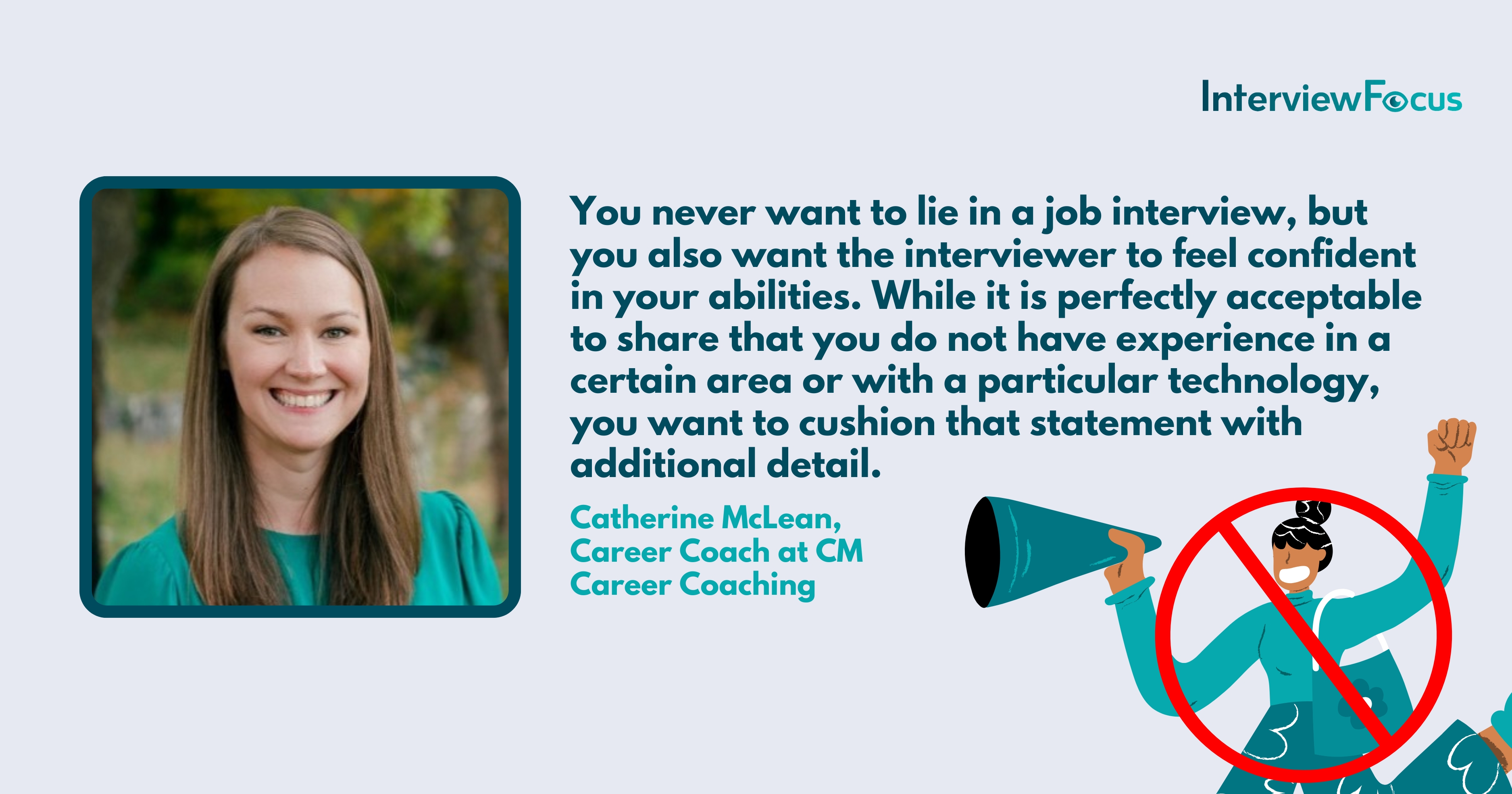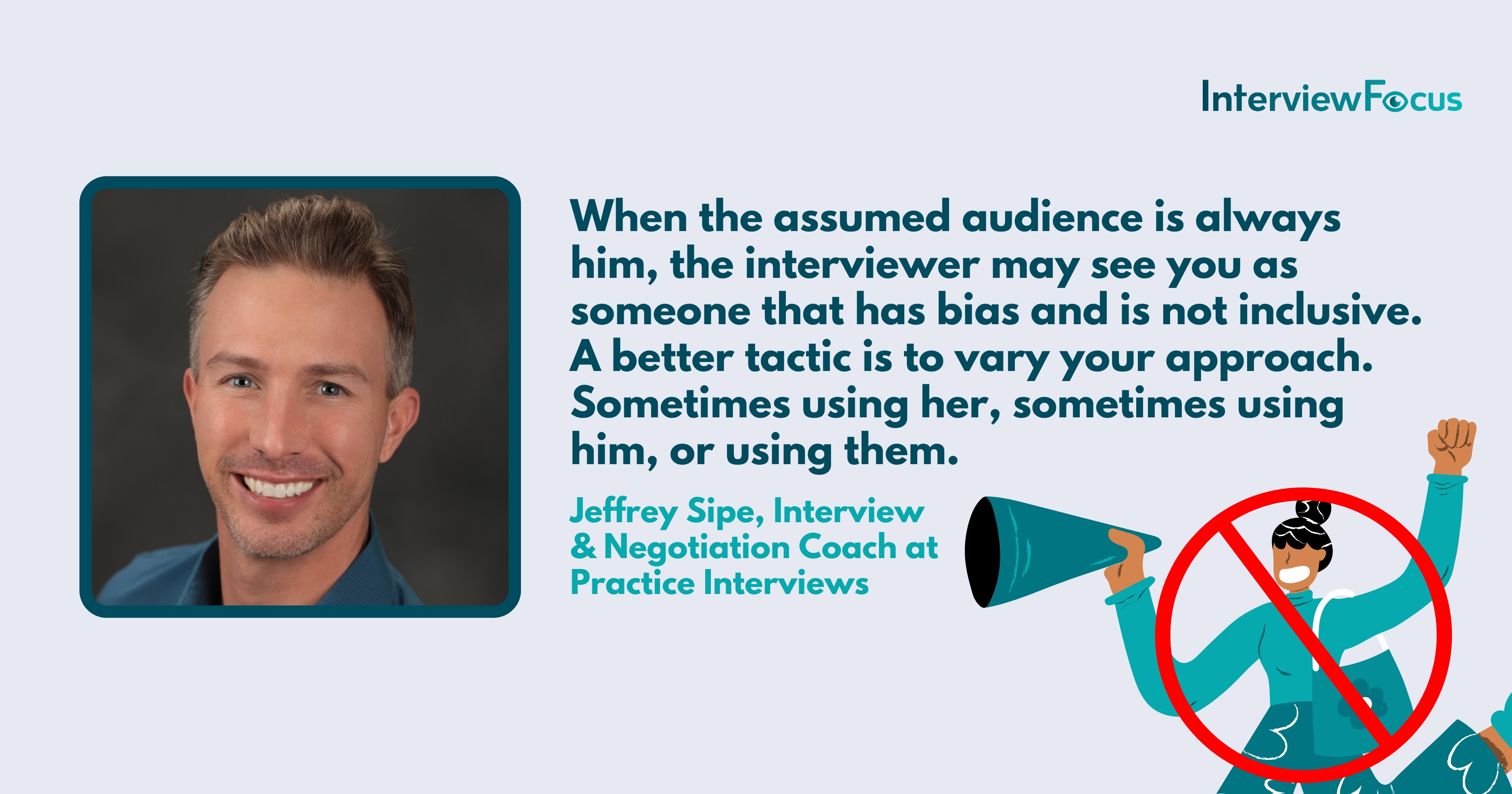From “No, I don’t have questions.” to “This is my weak point,” here are the 12 answers to the question, “What are some phrases a person should avoid saying in a job interview?”
- “No, I Don’t Have Any Questions”
- Do Not Say Curse Words or Use Informal Language
- “That’s a Good Question”
- “No, I Do Not Have Any Experience With That”
- Don’t Ramble on About Your Personal Life
- “Do You Have Any Hesitation Moving Me to the Next Step?”
- Using He/Him for Questions With an Assumed Audience
- Explaining Why You Left Your Last Job
- “It’s on My Resume”
- Intentionally Avoiding Your Soft Spots
- Focusing on the Exit Opportunities Rather than the Current Role
- “This Is My Weak Point”
“No, I Don’t Have Any Questions”
Saying you don’t have questions can be the difference between you making it to the final round and being put into the reject pile.
Candidates should always be prepared to ask interviewers questions, especially well-thought-out and research-based questions. This shows the interviewer your sincere interest and enthusiasm for the job and company.
Here are a couple of good questions to ask:
- Can you tell me what priorities this role will focus on in the first 30 days?
- What makes a person successful in this role?
Both questions give you an opportunity to learn more about the job and culture, as well as give you another opportunity to highlight/reiterate the reasons you are a great fit for the job.
Lucie Yeomans, President, Your Career Ally
Do Not Say Curse Words or Use Informal Language
I see it all the time when people step into an interview space they felt too comfortable, let their guard down, and either start using curse words or phrases like “Bruh, I know what you mean” or “Dude, exactly.”
Remember, the company wants to know you, but they also want to know that you fit in with the culture of the company. Someone that exemplifies that culture and holds it up will get the job. Someone that brings negativity that will tear it down won’t be invited back.
Nik Fialka, Pilot Interview Coach, Spitfire Elite Interview Consulting
“That’s a Good Question”
One thing that you should never say as a response to an interview question is “That’s a good question.”
The interviewer may perceive it negatively, and it may give off the wrong signal that you think that their other questions aren’t good. It could be viewed as a stall tactic to give you time to think of an answer because you aren’t prepared with an appropriate answer.
Finally, the interviewer might think that you are trying to butter them up with a compliment. Making a verbal judgment about the quality of an interview question can backfire on you.
Marni Hockenberg, Job Search Coach, Hockenberg Search
“No, I Do Not Have Any Experience With That”
You never want to lie in a job interview, but you also want the interviewer to feel confident in your abilities. While it is perfectly acceptable to share that you do not have experience in a certain area or with a particular technology, you want to cushion that statement with additional detail.
For example, they might ask you about your management skills if the target role has direct reports. If you have never managed someone before, you could talk about the time you led a project team or share details about your intended management style. If it is a technical experience that you lack, mention a similar tool that you do know, express enthusiasm for learning the new skill, and offer to research it prior to your start date.
In the end, providing more context leaves the interviewer with positive feelings about your candidacy rather than abruptly saying no.
Catherine McLean, Career Coach, CM Career Coaching

Don’t Ramble on About Your Personal Life
When an interviewer says “Tell me about yourself,” this is an invitation to summarize your professional background—not your personal life. If you haven’t already prepared your response to this common interview starter, it’s not uncommon for interviewees to ramble and over-share irrelevant details about their personal life.
They don’t need to know you have a husband and kids or how old you are. Rather, tell them how many years of experience you have in that industry; what education you are currently pursuing; something unique you’ve accomplished at your current job; and your vision for the future.
How you answer this opening question sets the tone for the rest of the interview. Prepare your answer ahead of time so you can start off strong and leave them wanting more.
Kim O’Neill, Authentic Confidence & Interview Coach, Kim O’Neill Coaching
“Do You Have Any Hesitation Moving Me to the Next Step?”
Asking this question reminds the interviewer of concerns they have about your candidacy. Instead, end on a positive note and ask, “What was it about my resume that prompted you to invite me for this interview?”
This reminds the interviewer of what they liked about you and ends the interview on a positive note. It also indicates the skills or experience to reinforce in your thank you note after the interview.
Jude Gaal, Résumé Writer & Employment Strategist, Résumé Redux
Using He/Him for Questions With an Assumed Audience
Job interview candidates should avoid using only the male gender when answering questions with an assumed audience.
For example, imagine you are working with leadership on “X” project, or how do you collaborate with other Engineers, etc.
When the assumed audience is always him, the interviewer may see you as someone that has bias and is not inclusive.
A better tactic is to vary your approach. Sometimes using her, sometimes using him, or using them. You can also use both, he or she, she or he, or again just them.
Jeffrey Sipe, Interview & Negotiation Coach, Practice Interviews

Explaining Why You Left Your Last Job
Don’t waste valuable time in your interview explaining why you left your last job. Too many times, interviewees think they need to explain every single detail of “what happened to them” at their last job. Instead, leave the past behind and focus on where you would like to go next.
Deb Sofield, Executive Speech & Presentations Coach, Executive Speech Coaching Co.
“It’s on My Resume”
Your resume is a snapshot of your professional life, and the aim is to secure an interview. The interviewer will ask you a question that gives you an opportunity to tell your “story.”
Create your career story using the STAR Method. Describe the Situation, outline the Task, explain the Actions you took, and the Results you got. This approach allows you to communicate your value and build your case that you are the right candidate.
Nashroon Mohammed, Certified Interview Coach & Career Strategist, Coach Nash
Intentionally Avoiding Your Soft Spots
We all have soft spots that are not part of our core competencies. If an interviewer asks you about a weakness, don’t use a lame retort, like poor handwriting. Employers look for and respect honesty.
For example, if you avoid delegating tasks, admit that is an area you struggle with, but follow it up by letting the interviewer know it is top of mind and you are striving to delegate more to others.
Sunny Simon, Career Coach, Raise the Bar High Career Coaching
Focusing on the Exit Opportunities Rather than the Current Role
Most companies want to keep you for the long term, although there are a few exceptions. Assuming that this is true, don’t say that this job is simply a pathway to exit opportunities such as a different sector or running your own business 2 years later. It’s better to focus on the positives of this role, the team, and the advantages of building a career at this firm and in this sector.
However, note that there are some exceptions, as some companies have roles that are more temporary, and expect you to move on after a certain amount of time. Here, you can be more open about your long-term goals.
Still, you want to focus on the positives of this job and show excitement and enthusiasm for the current role, and not just where it will get you later down the line.
Josh Jia, Founder, Finance Interview Coach
“This Is My Weak Point”
Even if the recruiter asks you directly “What are your weak points”, you need to know this is a trick question.
You must mention something you are not fantastic at—don’t play the “I am the perfect candidate” game—but make sure you don’t mention something structural for the job.
A suitable reply to this interview question should not make the recruiter doubt your capacity to do the job, so choose something that is true for you, but not related to the key job requirements.
Also, move your reply as soon as possible to share what you are doing to improve that weak point, instead of just mentioning the weak point and finishing your reply like that.
Here’s a real example:
“I have an intermediate level in Excel, so I recently signed up for an online course about it, and I am much more confident now about formulas, macros, and learning about Pivot tables” (if advanced Excel level is not a requirement for the position you are applying for.)
Juliana Rabbi, Career Coach for Remote Jobs, Juliana Rabbi






